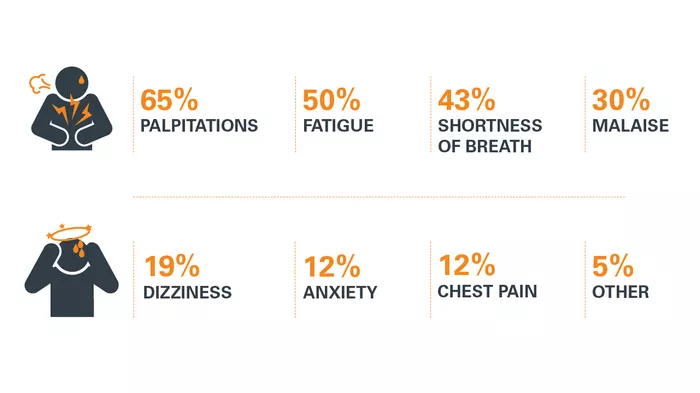Atrial fibrillation (AFib) is a common cardiac arrhythmia characterized by irregular and often rapid heartbeats. It affects millions of people worldwide and can significantly impact quality of life if left untreated. Recognizing the symptoms of AFib is crucial for early detection and appropriate management. This article aims to comprehensively explore the various signs and symptoms associated with AFib, empowering individuals to seek timely medical attention and improve their overall cardiovascular health.
Atrial fibrillation is a cardiac condition characterized by chaotic electrical activity in the upper chambers of the heart, known as the atria. This irregular electrical activity disrupts the normal rhythm of the heart, leading to an erratic heartbeat. While AFib itself may not always pose an immediate threat, it significantly increases the risk of complications such as stroke, heart failure, and other cardiovascular issues. Identifying the symptoms of AFib early on allows for prompt intervention and management, reducing the risk of associated complications and improving overall prognosis.
Understanding the Symptoms
The symptoms of atrial fibrillation can vary widely among individuals and may range from subtle to severe. Some individuals may experience occasional episodes of AFib, while others may have persistent or permanent forms of the condition. It is essential to recognize that not everyone with AFib will exhibit noticeable symptoms, and the absence of symptoms does not necessarily indicate the absence of the condition. However, common signs and symptoms associated with AFib include:
1,Palpitations: Palpitations refer to a sensation of rapid, fluttering, or pounding heartbeat. Individuals with AFib often describe feeling their heart racing or skipping beats. Palpitations may occur intermittently or persistently and can be accompanied by feelings of lightheadedness or dizziness.
2. Fatigue: Chronic fatigue is a prevalent symptom among individuals with AFib. The irregular heartbeat associated with the condition can impair the heart’s ability to pump blood effectively, leading to reduced oxygen delivery to the body’s tissues. As a result, individuals may experience persistent tiredness or weakness, even with minimal exertion.
3. Shortness of Breath: Difficulty breathing or shortness of breath, especially during physical activity or exertion, is a common symptom of AFib. The irregular heartbeat can impair the heart’s ability to pump blood efficiently to meet the body’s oxygen demands, resulting in breathlessness or a sensation of being unable to catch one’s breath.
4. Chest Discomfort or Pain: Some individuals with AFib may experience chest discomfort, pressure, or pain, resembling symptoms of angina or a heart attack. This discomfort may occur intermittently and can vary in intensity. It is essential to seek medical evaluation promptly to rule out potentially life-threatening conditions.
5. Dizziness or Lightheadedness: The irregular heartbeat associated with AFib can disrupt blood flow to the brain, leading to feelings of dizziness, lightheadedness, or fainting (syncope). These symptoms may occur suddenly and can be exacerbated by changes in body position, such as standing up quickly.
6. Weakness or Fatigue: Chronic fatigue and weakness are common symptoms of AFib, often resulting from reduced blood flow and oxygen delivery to the body’s tissues. Individuals may feel physically drained or unable to perform routine activities without experiencing excessive fatigue.
7. Fainting or Near-Fainting Spells: Episodes of fainting or near-fainting (pre-syncope) may occur in individuals with AFib due to inadequate blood flow to the brain. These episodes can be alarming and should prompt immediate medical evaluation to determine the underlying cause.
8. Anxiety or Panic Attacks: The irregular heartbeat and associated symptoms of AFib can trigger feelings of anxiety or panic in some individuals. The fear of experiencing palpitations, shortness of breath, or other AFib-related symptoms may exacerbate existing anxiety disorders or lead to panic attacks.
9. Reduced Exercise Tolerance: Individuals with AFib may notice a decline in their exercise tolerance or endurance levels. The irregular heartbeat and reduced cardiac output can limit the body’s ability to meet the increased oxygen demands during physical activity, leading to fatigue, breathlessness, or chest discomfort with exertion.
10. Other Symptoms: In addition to the primary symptoms mentioned above, AFib may also present with other nonspecific symptoms, such as nausea, abdominal discomfort, or a feeling of impending doom. These symptoms can vary in intensity and may be challenging to attribute directly to AFib without further medical evaluation.
It is important to note that the severity and frequency of symptoms can vary among individuals with AFib. Some may experience occasional, mild symptoms, while others may have persistent or severe manifestations requiring immediate medical attention. Additionally, certain factors such as age, underlying medical conditions, and the presence of other cardiovascular risk factors can influence the presentation of AFib symptoms.
Conclusion
Recognizing the symptoms of atrial fibrillation is essential for early detection, diagnosis, and management of this common cardiac arrhythmia. While the symptoms of AFib can vary widely among individuals, common signs such as palpitations, fatigue, shortness of breath, and chest discomfort should not be ignored. Prompt medical evaluation and appropriate treatment are crucial for reducing the risk of complications and improving overall cardiovascular health. By raising awareness of AFib symptoms and encouraging proactive healthcare-seeking behaviors, we can empower individuals to take control of their heart health and lead fulfilling lives free from the burdens of untreated AFib.

